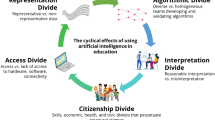Abstract
Educators find themselves in the midst of arising tide of urban school reform marked byevermore centrally designed and monitoredsystems of accountability. In response to thislooming high-stakes gaze of surveillance, thisessay offers an ethics of educationalleadership predicated upon taking up thechallenge of creatively and courageouslyauthoring one's ethical self. It seeks tocontribute to mapping an ethical terrain whichcan support the production of pedagogicalpractices, initiatives, and agendas asdistinctive, bold responses to theproliferation of one-dimensional,technicist-driven efforts which narrowlycalculate and assess student learning, teacherwork, school effectiveness, and which offeranemic, foreclosed readings of a possiblefuture. My claim is that a consideration ofFoucault's ethics draws us closer torecognizing what such a project would mean andask of the educator as leader.
Similar content being viewed by others
REFERENCES
Aronowitz, S. & Giroux, H. (1991). Postmodern education: Politics, culture, and social criticism. Minneapolis: University of Minneapolis Press.
Bartowski, F. (1988). Epistemic drift in Foucault. In I. Diamond and L. Quinby (Eds), Feminism and Foucault: Reflections and resistance, Vol. 46. Boston: Northeastern University Press.
Bernauer, J. (1987). Michel Foucault's ecstatic thinking. Philosophy and Social Criticism, 2(3), 182.
Bernstein, R. (1992). The new constellation: The ethical-political horizons of modernity/postmodernity (p. 165). Cambridge: The MIT Press.
Camus, A. (1978). The plague, as cited in Maxine Greene, “teaching: The question of personal reality.” Teachers College Record 80(1), 31.
de Certeau, M. (1995). The practice of everyday life. In J. Ahearne (Ed.), Michel de Certeau: Interpretation and its other, trans. Steven Rendall (p. 161). Stanford: Stanford University Press.
Dreyfus, H. & Rabinow, P. (1986). What is maturity? Habermas and Foucault on ‘what is enlightenment?’ In D. Hoy (Ed), Foucault: A critical reader (pp. 109-122). Oxford: Basil Blackwell.
Foucault, M. (1970). The order of things: An archaeology of the human sciences (p. 387). New York: Vintage Books.
Foucault, M. (1972). The archaeology of knowledge and the discourse on kanguage, trans. A.M. Sheridan Smith (p. 230). New York: Pantheon Books.
Foucault, M. (1977). A preface to transgression. In D.F. Bouchard (Ed), Language, counter-memory, practice, trans. Donald F. Bouchard and Sherry Simon (p. 41). Ithaca, NY: Cornell University Press.
Foucault, M. (1979). Discipline and punish: The birth of the prison, trans. Alan Sheridan (pp. 190-191). NY: Vintage Books.
Foucault, M. (1983). In J. Pearson (Ed), Discourse and truth: The problematization of parrhesia. Notes to the seminar given by Michel Foucault at the University of California at Berkeley. Evanston, IL: Northwestern University.
Foucault, M. (1984). On the genealogy of ethics: An overview of a work in progress. In P. Rabinow (Ed), The Foucault reader (pp. 352-353). New York: Pantheon Books.
Foucault, M. (1984). Politics and ethics: An interview. In P. Rabinow (Ed), The Foucault reader, trans. Catherine Porter. New York: Pantheon Books.
Foucault, M. (1985). The uses of pleasure: The history of sexuality vol. 2, trans. Robert Hurley (pp. 8-11). New York: Viking.
Foucault, M. (1988). Technologies of the self. In L.H. Martin, H. Gutman, & P.H. Hutton (Eds), Technologies of the self: A seminar with Michel Foucault (p. 19). Amherst: The University of Massachusetts Press.
Foucault, M. (1993). Talk with philosophers 23 October, 1980. As cited in James Miller, The passion of Michel Foucault (p. 342). New York: Simon & Schuster.
Foucault, M. (1997). Self writing. In R. Hurley et al. (Eds), Michel Foucault: Ethics, subjectivity and truth, trans. Paul Rabinow (p. 207). New York: The New Press.
Freire, P. (1998). Pedagogy of freedom: Ethics, democracy, and civic courage, trans. Patrick Clark (p. 38). Lanham, MD: Rowman & Littlefield Publishers, Inc.
Giroux, H.A. (1994). Disturbing pleasures: Learning popular culture. New York: Routledge.
Gore, J.M. (1993). The struggle for pedagogies: Critical and feminist discourses as regimes of truth (pp. 89-90). New York Routledge.
Greene, M. (1973). Teacher as strange (p. 256). Belmont, CA: Wadsworth Publishing Company, Inc.
Habermas, J. (1986). Taking aim at the heart of the present. In D.C. Hoy (Ed), Foucault: A critical reader (pp. 103-108). Oxford: Basil Blackwell.
Leahy, R. (1994). Fall, authenticity: From philosophic concept to literary character. Educational Theory 44(4), 447-461.
Leithwood, K. (1999). An organizational perspective on values for leaders of future schools. In P.T. Begley (Ed), Values and educational leadership (p. 38). Albany: SUNY Press.
McLaren, P. (1997). Revolutionary praxis: Toward a pedagogy of resistance and transformation. Educational Researcher 26(6), 25.
Nathan, J. (1996). Charter schools: Creating hope and opportunity for American education (pp. xiii-xiv). San Francisco: Jossey-Bass.
Nietzsche, F. (1967). The will to power, trans. Walter Kaufmann and R.J. Hollingdale (pp. 421, 431–432). New York: Vintage Books.
Nietzsche, F. (1968). The gay science, trans. Walter Kaufmann (p. 290). New York: Vintage Books.
Raywid, M.A. (1997–1998). How great is small?! Taking stock of the small schools movement. In The challenge of small schools: Selected proceedings from the Bank Street College of Education Third and Fourth Annual Conference on Educational Leadership and School Reform,Vol. 6.
Rorty, R. (1989). Contingency, irony, and solidarity. Cambridge: Cambridge University Press.
Sartre, J-P. (1956). Being and nothingness, trans. Hazel E. Barnes. New York: Pocket Books.
Schroyer, T. (1973). Forward. In Theodor W. Adorno (Ed), The jargon of authenticity, trans. K. Tarnowski & F. Will (pp. ix-x). Evanston: Northwestern University Press.
Schutte, O. (1984). Beyond nihilism: Nietzsche without masks. Chicago: The University of Chicago Press.
Simon, R. (1992). Teaching against the grain: Texts for a pedagogy of possibility. New York: Bergin & Garvey.
Taylor, C. (1989). Sources of the self: The making of the modern identity (p. 489). Cambridge: Harvard University Press.
Wasley, P., Hampel, R.L., & Clark, R.W. (1997). Kids and school reform. San Francisco: Jossey-Bass.
Author information
Authors and Affiliations
Rights and permissions
About this article
Cite this article
Pignatelli, F. Mapping the Terrain of a Foucauldian Ethics: A Response to the Surveillance of Schooling. Studies in Philosophy and Education 21, 157–180 (2002). https://doi.org/10.1023/A:1014441022794
Issue Date:
DOI: https://doi.org/10.1023/A:1014441022794




